DPS evaluates adding tasers to officer belts
Like their peers in the Los Angeles Police Department, USC’s Department of Public Safety officers are armed with a handgun, meant for use in severe situations.
Unlike LAPD though, DPS is currently not armed with tasers.
Campus police is considering providing its officers with these less-lethal weapons, amid a nationwide discussion over police use of force on college campuses, according to DPS.
Last month, the president of the LGBT club at Georgia Tech died in the hands of police while they went through a mental breakdown, according to the victim’s family’s lawyer.
Scout Schultz, a senior majoring in engineering and the president of Georgia Tech’s Pride Alliance, was killed by a school police officer on Sept. 17, after the campus police department received a 9-1-1 call that Schultz, who was gender non-binary, was carrying a gun near a parking garage on campus, according to the Georgia Bureau of Investigation.
Video footage of Schultz’s death showed that they were holding a multi-purpose tool in their hand and were walking toward officers yelling, “Shoot me, Shoot me!” Officers retreated and called for backup. One of the five officers shot at Schultz, killing him.
On the Georgia Tech campus, police officers only had one tool for defense: a gun.
At USC, DPS is working to make sure that using lethal force is not the only option.
“We are currently evaluating the use of tasers for our officers,” said DPS Assistant Chief David Carlisle. “It’s a less lethal form of disabling a person. I would suspect that in the future, we will be carrying tasers so that if our officers are placed in that [kind of] situation, there is an alternative to deadly force.”
Shanéa Thomas, a senior lecturer at the USC Dworak-Peck School of Social Work who has worked with LGBTQ youth, said that the most important step toward avoiding situations like the one with Schultz is providing officers with training to avoid the use of lethal force.
“The ways we react to distress isn’t necessarily to shoot somebody,” Thomas said. “The answer is to find out what is going on … I believe we can do all that without weapons.”
For students, seeing officers with guns on campus can be alarming, but also reassuring. Nicole Spence, a sophomore majoring in chemical engineering, grew up in South Africa, where neither citizens nor police officers are allowed to carry guns.
Though Spence disproves of guns as a whole, she said she understands why officers would have them, as citizens are allowed to cary guns in the United States.
“The ideal situation would be to shoot at their leg,” Spence said. “There needs to be a policy to only incapacitate and not kill.”
She said she feels safer knowing that DPS officers are armed in case someone “with malicious intent” also has a weapon on campus.
Currently, DPS officers are categorized either as community service officers or public safety officers.
CSOs do not carry guns or batons, but are allowed to carry Mace defense spray. PSOs are fully armed and train alongside other officers in the LAPD Academy, Carlisle said.
In the six-month academy, PSOs work alongside LAPD trainees and are trained to deal with people experiencing mental health crises.
“The goal of the Department is to provide a humane, cooperative, compassionate and effective law enforcement response to persons within our community who are afflicted with mental illness and disorders,” LAPD said in a press release last year. “The Department believes that this training is cutting edge and provides our personnel with increased skills to serve our communities.”
Along with attending these workshops, DPS officers must commit to consistent evaluations on their effective use of weapons and are trained for different types of scenarios, whether it be facing a person with a weapon or pulling somebody over for a traffic violation.
“We track every officer’s training to make sure that they meet this training standard — a minimum of 24 hours of continuous professional training,” Carlisle said. “There is no shortage of training.”
Specifically considering the situation in Georgia Tech, Carlisle said that every situation is different, but with a call like the one at the East Coast campus, DPS would have probably asked LAPD for help.
“It would be important to learn from that scenario or any other officer-involved shooting … what was in the officer’s mind when they pulled the trigger?” Carlisle said. “We will do whatever we could to avoid the use of deadly force.”

